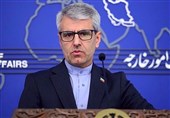WHO Declares Global Public Health Emergency over Mpox Surge in Africa
TEHRAN (Tasnim) – The World Health Organization (WHO) declared the escalating monkeypox outbreak across Africa a public health emergency of international concern (PHEIC), urging immediate global cooperation and vaccination efforts to contain the spread.
The monkeypox virus, long endemic in central Africa, particularly the Democratic Republic of the Congo (DRC), has prompted renewed global attention following a surge in cases since late 2022.
In response to the outbreak, the WHO declared an emergency and renamed the disease "mpox" to avoid stigma.
"On top of outbreaks of other mpox clades in DRC and other countries in Africa, it's clear that a coordinated international response is needed to stop these outbreaks and save lives," WHO Director-General Dr. Tedros Adhanom Ghebreyesus said on Wednesday.
This announcement followed a decision by the WHO emergency committee, which determined the rise in infections could spread further across Africa and beyond the continent.
The Africa Centers for Disease Control and Prevention (CDC) has also declared a health emergency, noting the virus's spread to Burundi, Kenya, Rwanda, and Uganda.
According to WHO data, over 14,000 cases and 524 deaths have been reported this year, surpassing last year’s totals.
"The virus appears to be spreading mainly through sexual networks," Dr. Tedros noted, expressing particular concern over the trend. The WHO has long identified gay men as a key population affected by the virus.
WHO Emergency Committee Chair Professor Dimie Ogoina echoed these concerns, stating, "The current upsurge of mpox in parts of Africa, along with the spread of a new sexually transmissible strain of the monkeypox virus, is an emergency not only for Africa but for the entire globe."
Ogoina added, "Mpox, originating in Africa, was neglected there, and later caused a global outbreak in 2022. It is time to act decisively to prevent history from repeating itself."
To combat the outbreak, the WHO has recommended the use of two vaccines approved by national regulators and activated emergency use procedures for countries that have not yet approved them.
Dr. Tedros estimated that the initial cost of the regional response plan would be $15 million. The WHO has already allocated $1.45 million from its Contingency Fund for Emergencies, with plans for additional funding in the coming days.
Mpox is primarily transmitted through skin and mucosal contact with infected persons, contaminated materials, or animals. Symptoms include an acute rash, back pain, swollen lymph nodes, muscle aches, high fever, and headaches. First detected in monkeys in the 1950s, the virus was reported in humans in 1970 in what was then known as Zaire.






